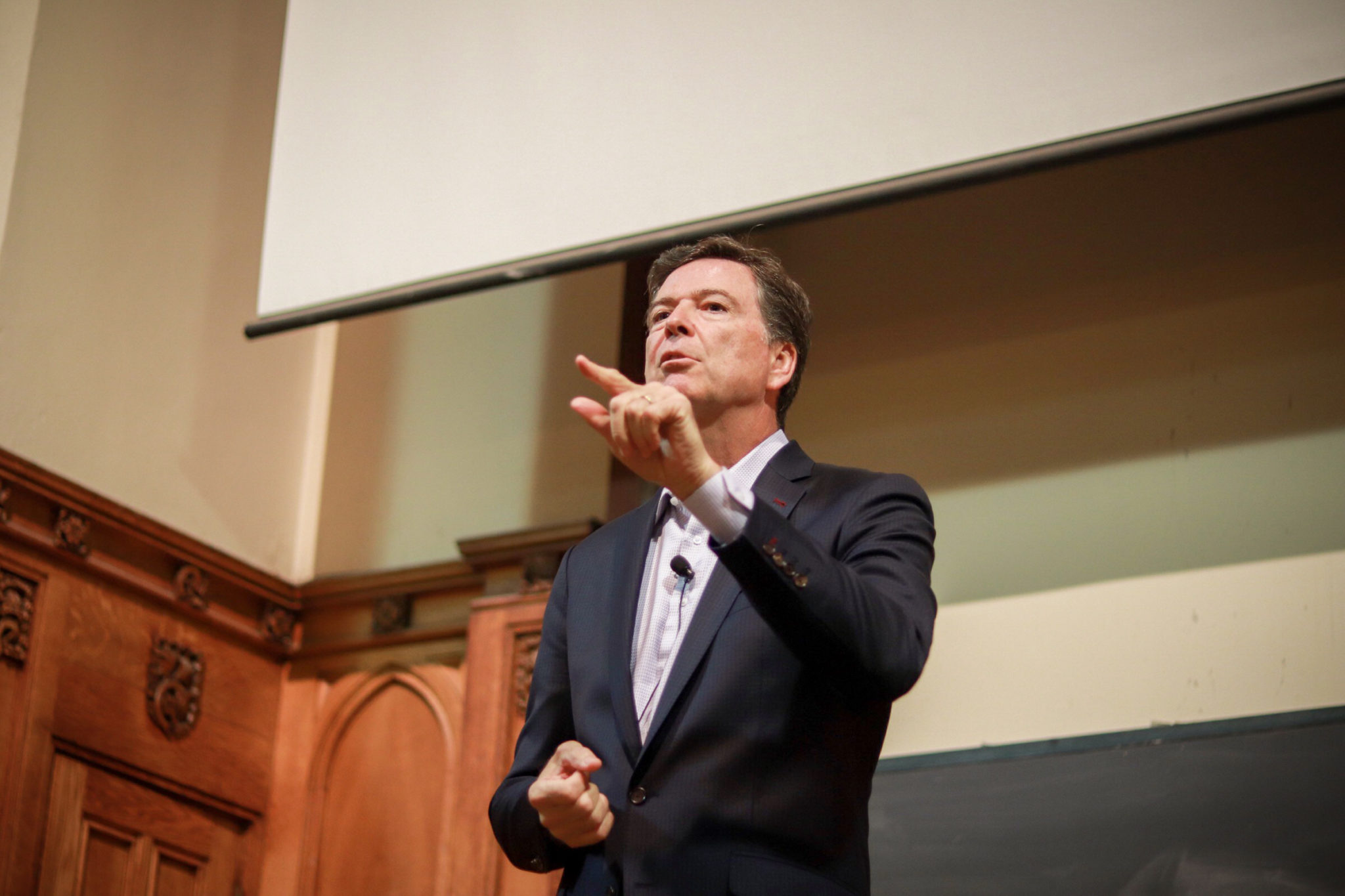
Marisa Peryer
On Tuesday morning, a woman approached former Federal Bureau of Investigations Director James Comey in the Yale Law School and said, “You’re a s—thead! Thanks, s—thead, for giving us Donald Trump.”
“Thank you for the feedback,” Comey replied.
Comey relayed this anecdote while addressing a packed room in Sheffield-Sterling-Strathcona Hall on Tuesday evening. He spoke in front of a crowd of approximately 400 students and community members regarding foreign interference in the 2016 U.S. presidential election. The event, organized by the Yale College Democrats and co-sponsored by The Politic, Every Vote Counts and the Yale International Relations Association, garnered nearly 1,500 “interested” responses on Facebook, as of the start of the event.
Comey discussed Russian interference in U.S. affairs and the polarized state of modern politics. He shared his optimism that there would soon be a “remarkable upward jag” in American history — an inevitable return to the norm of decent public discourse. He also described his perception that — despite the appearance of a hyper-divided American electorate — the public ideological spectrum is a “bell curve” with two ultra-vocal ends and an often-apathetic central plurality. Comey encouraged the audience, largely composed of undergraduates, to engage with the 2020 presidential election and help awaken the “sleeping giant” of the electorate.
“I hope we will encourage, stimulate — and in some ways beg — all of America to participate in the next presidential election,” Comey said.
Following his opening remarks, the four-year FBI veteran and former U.S. deputy attorney general engaged in a dialogue with Yale Dems event coordinator Aliesa Bahri ’22. She asked him questions about the circumstances surrounding 2016 election interference, cybersecurity preparations for the 2020 election and his changing views on a potential Trump impeachment in light of the evolving Ukraine investigation.
In a statement to the News, Bahri explained that she believed it might be “useful” to provide students with the opportunity to learn about Comey’s perspective on the FBI’s role in the 2020 elections, as well as ask “legitimate questions” about his decision making during his tenure as FBI director.
Comey elaborated on his conflicting feelings on impeachment. He explained that as a private citizen, he initially hoped that Trump would not be impeached and removed from office and would instead be subject to a stronger force — failing to secure reelection in 2020.
At the same time, Comey explained he believes that there is a certain point at which Congress must “discharge [its responsibility to] the [U.S.] Constitution.”
Still, Comey said that for an impeachment inquiry to be successful, there would need to be a critical mass of public sentiment to empower House Republicans to vote for the removal of President Trump. He said that the Mueller report — while damning for everyday citizens — did not garner the requisite response to warrant impeachment.
“If anyone in this auditorium had engaged in the conduct in the Mueller report, you would already be in jail,” Comey said.
The final segment of the event invited audience members to submit questions via notecards. Comey answered questions about diversity initiatives he spearheaded while serving as FBI director. He also described his creation of a curriculum that required new agents at the FBI Academy to study the agency’s history of wire-tapping, coercion and other illicit acts — including allegedly encouraging Dr. Martin Luther King Jr. to commit suicide. Today, FBI trainees travel to Washington, D.C. to visit the MLK memorial and write essays reflecting on the intersection of King’s teachings and the agency’s mission.
Questions from the audience prompted the former director to speak at length about the FBI’s investigation into former Secretary of State Hillary Clinton’s LAW ’73 use of a personal email server. He spoke at length about the controversial decision to reopen the investigation only one week before the 2016 presidential election — a choice many thought affected the election’s outcome.
“I hated being involved,” Comey said. “It’s a nightmare from which I still can’t awaken.”
Attendee Sophie Kane ’23, when asked about Comey’s reasoning, said that she thought Comey had “come up [with] a good answer for” his decision.
“But it’s still up to each person to decide whether they’re willing to accept that,” she said.
Due to high student interest, the event was moved from Linsly-Chittenden Hall to SSS and was restricted to ticket-holders. Tickets sold out within 18 hours of their release.
Students who were not able to get a ticket but were still interested in the event were permitted to wait in line in the SSS lobby in the event that ticket-holders did not claim their seats. Many students were ultimately admitted to the event and were able to watch the former director from the balcony of the lecture hall.
“He was a lot more vulnerable and honest than I expected,” Dems member Rosie Rothschild ’23 told the News after the event. “I thought that he definitely tried his best to sound as genuine as he could.”
Comey was dismissed from his position as FBI director on May 9, 2017.
Julia Bialek | julia.bialek@yale.edu and
Olivia Tucker | olivia.tucker@yale.edu







